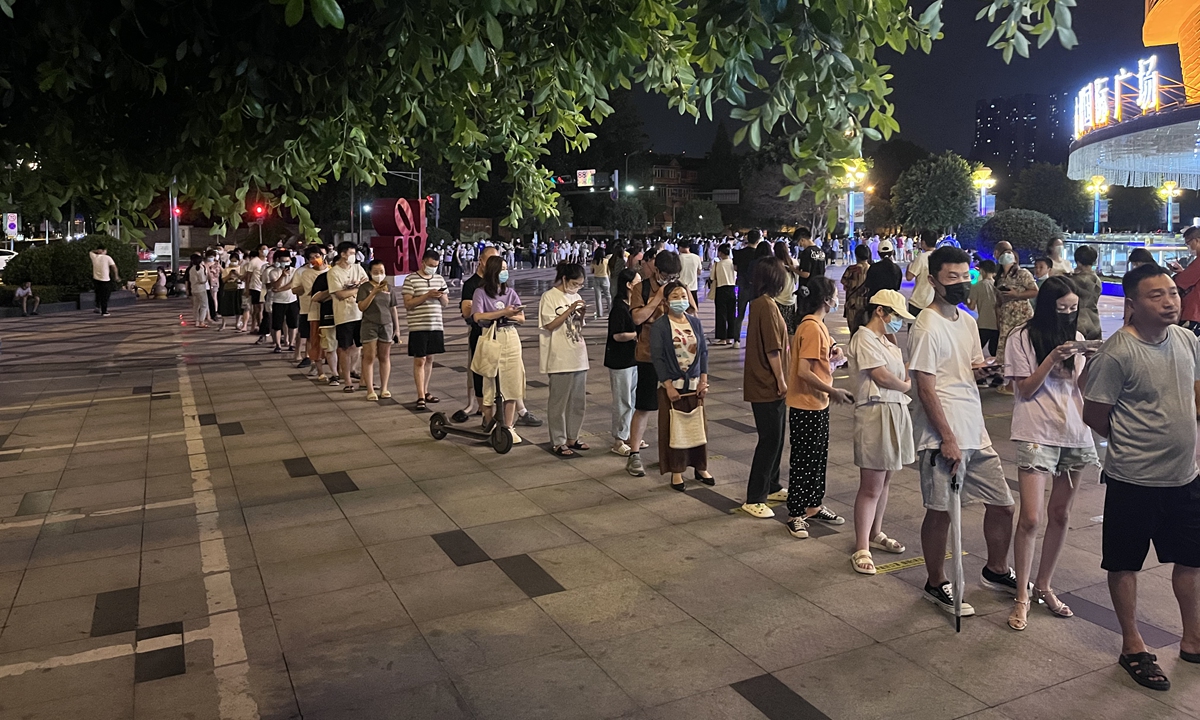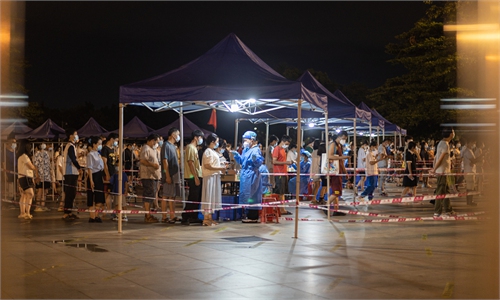Chengdu in SW China’s Sichuan tightens management to curb the fast spreading of the latest Omicron BA.2.76 flare-up

Residents line up to take nucleic acid tests in Chengdu, Southwest China's Sichuan Province on August 27, 2022. Photo: IC
Chengdu, capital city of Southwest China's Sichuan Province tightened its COVID-19 epidemic prevention and control starting Tuesday by rolling out measures including carrying out citywide nucleic acid testing, suspending operation of entertainment venues and putting off the autumn semester for local schools in a bid to curb the fast spreading of the sudden flare-up started on August 25 in a timely manner.
Sichuan registered 167 new local confirmed infections and 109 asymptomatic carriers of COVID-19 on Monday, including 141 confirmed cases and 70 asymptomatic carriers in Chengdu. The accumulated infections in Chengdu has reached 500 as of Monday.
According to the Chengdu Center for Disease Control & Prevention, the sudden COVID-19 outbreak started on August 25 is developing swiftly. Gene sequencing results of the virus showed that the flare-up was caused by the Omicron variant BA.2.76 which had also caused flare-ups in multiple other places inside and outside Sichuan. The strain has led to cluster infections in many places across the country due to its rapid spreading speed, strong transmission capacity and latent characteristic.
Chengdu city epidemic prevention and control headquarters released notification on Tuesday, urging a strict implementation of classified management on different areas according to different risk levels. Districts, counties and cities of high risk with infections discovered will be placed under lockdown and residents from areas of medium-risk are restricted in their compounds.
A citywide nucleic acid testing will be carried out and the residents have to present negative nucleic acid testing results obtained within 48 or 24 hours to enter public venues.
The autumn semester for local kindergartens and primary and middle schools scheduled to start on September 1 will be put off and all kinds of onsite training courses are suspended.
Dine-in services in key areas are also suspended and the operation of all kinds of entertainment and cultural venues such as internet café, libraries and indoor stadia are suspended.
In addition, management on departing and arriving at the city is also tightened with personnel departing the city required to obtain negative nucleic acid testing results obtained within 24 hours.
According to the epidemic prevention authority, the measures came into effect since Tuesday will be implemented for five days and will be dynamically adjusted based on the progress of the epidemic and the need for prevention and control.
Apart from the citywide epidemic control measures, several districts in Chengdu, including Jinjiang, Gaoxin, Wuhou, Chenghua, Qingyang and Jinniu districts also detailed their respective epidemic prevention and control measures on Tuesday.
Besides, Chengdu Motor Show 2022 scheduled to be held at Western China (Chengdu) International Expo City from August 26 till September 4 was also suspended accordingly.
Apart from Chengdu, Luzhou city in Sichuan, also tightened the management at community level in parts of Longmatan district, with a series of measures including lockdown at high-risk areas and suspension of in-person education of new semester for local schools.
Luzhou reported one more asymptomatic infection on Monday and accumulated eight infections including two confirmed cases and six asymptomatic carries since August 24, according to Health Commission of Luzhou City, thecover.cn reported.
As sporadic cases reported across the country are increasing these days, multiple places across the nation, such as Central China's Henan Province, Dalian city in Northeast China's Liaoning Province, Lanxi county in Suihua city, Northeast China's Heilongjiang Province and Longhua district in Shenzhen, South China's Guangdong Province have stepped up their epidemic prevention and control measures, including lockdown or all-member nucleic acid testing.
Global Times



